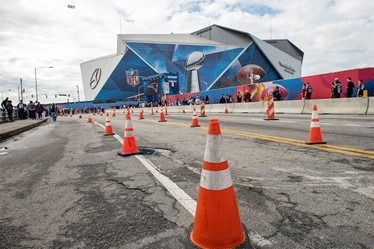Everyone loves a special event, be it a parade, concert, street festival, marathon, sporting competition and so on. Planning and executing a successful large-scale special event can be an exhilarating experience, but one that comes with its fair share of challenges, especially when it comes to managing traffic and ensuring smooth transportation for attendees.
The last thing event organizers want is to deal with traffic congestion, parking chaos and frustrated guests. To keep your special event on track and create a seamless experience for all, traffic management is key. Whether you need barricades along a race course, temporary traffic control for crowds or to keep parking lots running smoothly, a specialist can provide a turnkey solution.
In this article, we will explore the benefits of traffic control planning that helps to ensure a positive experience for all attendees.
Steps to Success
As you begin your planning, below are some best practices for event directors and coordinators to keep in mind when organizing an event that will require traffic management.
1. Plan Far Ahead
To save time and money, plan traffic control measures long before your event takes place. Understanding the accessibility of the venue is crucial. Traffic management specialists assess nearby roadways, public transportation options and potential chokepoints to devise the most efficient traffic flow plan. Your local municipality may request changes or additions to these drawings, so planning early gives teams the necessary time to adjust without jeopardizing the event.
Read More: Event Safety PSA: Failing to Prepare Could Cost You
If this crucial step is put off, things can quickly go awry when details change. More time for traffic control planning means fewer last-minute concerns. No two events are the same, and traffic management specialists understand this well in creating tailored solutions that align with the event’s size, nature and audience.
2. Hire Trained Professionals
While some events use volunteers for traffic control, there are plenty of reasons to hire professionals for the job. Laws governing public and private roads are extremely complex, meaning traffic control specialists must receive ongoing training and education to remain compliant with these regulations.
Read More: Price-Conscious Wow: How Meeting Planners Find More Value With AV Partners
In addition to carrying American Traffic Safety Services Association (ATSSA) flagger certifications, these individuals must complete first-aid and HAZMAT training, ensuring they are prepared for any situation. Professionals who come fully equipped wearing proper safety gear—in clearly marked vehicles and using approved traffic control devices—add an indispensable layer of organization and security to large events.
3. Use Proper Equipment
Safe and compliant equipment is crucial to a successful event. A professional traffic control manager will supply message and arrow boards, barrels and cones, barricades, rumble strips and other tools and devices that help ensure no one is exposed to safety risks.
Relying on volunteers who are not trained to read plans, set up equipment and maintain it throughout the event is a decision that can put people in harm’s way, making it vital to ensure workers have the right experience to handle the job. If you do plan to rent the necessary equipment, be sure to order far in advance (at least 8-10 weeks) to avoid supply shortages or cost hurdles.
4. Find Parking Solutions

Finding adequate parking space for a large number of attendees can be daunting. Traffic control managers work closely with event organizers to design efficient parking layouts and ensure smooth ingress and egress, often incorporating shuttle services, valet parking or parking reservations to simplify the process and enhance the overall guest experience.
5. Leverage Your Partner
From initial planning through event day, communication is critical. You need a partner that will join you in the command center to help monitor the day’s activities and provide real-time solutions to last-minute problems, communicating with your team for the duration to make certain everything continues according to plan. Embracing technology can also significantly enhance traffic management. Professionals may employ advanced tools such as traffic simulation software, GPS tracking and real-time data analytics to monitor traffic patterns and adjust plans accordingly during the event. Crucially, you and your partner should also meet after the event to identify areas of improvement for the next big occasion.
As the number of attendees increases, so does the complexity of managing traffic and transportation. Special events often draw large crowds, and if traffic flow is not properly managed, it can result in traffic congestion, parking chaos, unhappy attendees and even potential safety hazards. These challenges can quickly overshadow the carefully planned aspects of your event and lead to negative feedback from participants. Embracing the expertise of traffic management specialists is a surefire way to guarantee the success of large-scale events and build a reputation for excellence in event planning.
Get more tips to help ensure a happier, safer event experience for your participants.
—
 Seth Walpole is vice president of integration and transformation for AWP Safety, North America’s leader in professional traffic management. In this role, Seth is responsible for strategic operational leadership and promoting a strong safety and compliance culture.
Seth Walpole is vice president of integration and transformation for AWP Safety, North America’s leader in professional traffic management. In this role, Seth is responsible for strategic operational leadership and promoting a strong safety and compliance culture.
With 20 years of experience within distribution, utilities and traffic control industries, Seth brings a wealth of experience to his role from his time working as vice president of operations and finance for K&M Tires and a project manager for Asplundh Construction Corporation, supporting power-line construction operations.




